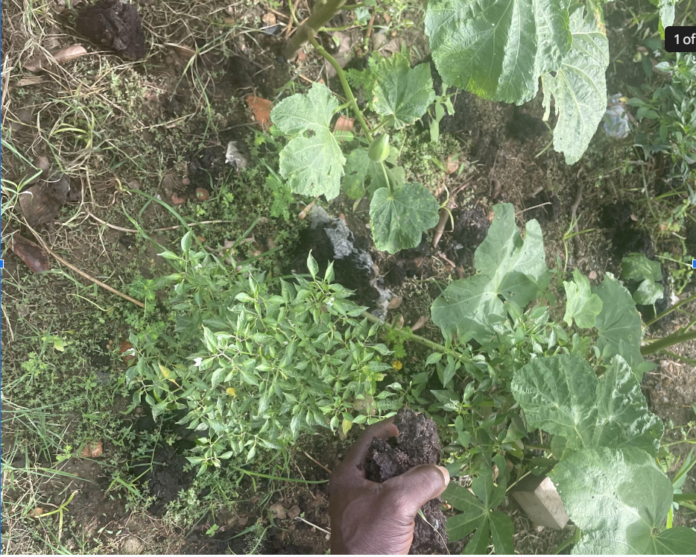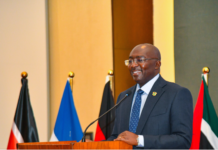
60-year-old Asibi Abongo fans a sizable pot of salted corn atop a coal pot resting on red-hot charcoal, inside her thatched-roof house in Zoggu, a small village in the Northern region of Ghana.
The rural settlement is home to about 2,500 people — mostly farmers — and Abongo has been farming for the past 10 years. This year, she said she lost all her livestock to drought and her harvest was less than a quarter the usual amount.
“Now the hardship we are experiencing is simply unbearable. Since my husband died 7 years ago, it’s the farming that has been sustaining us but now, that’s also being threatened by drought, and extreme flooding in recent times ,” Abongo said.
The world is rapidly approaching a critical warming threshold, causing significant concern among scientists.
This year, on approximately one-third of the days, the average global temperature exceeded the 1.5°C increase compared to pre-industrial levels. The world witnessed the hottest season ever recorded, with temperatures significantly above normal. June broke previous records with its intense heat, while July saw exceptionally high temperatures that affected a large part of the global population. This extreme heatwave resulted in floods, hurricanes, and wildfires.
In recent times, climate change has made seasonal droughts worse in northern Ghana, where most of the country’s food is grown.
Deserts are spreading and when the rains finally come, they are so strong that homes, crops and livestock are washed away.
Africa is one of the most vulnerable continents in the world to climate change, according to the Intergovernmental Panel on Climate Change.
While the region contributes negligibly to the changing climate, with just about 2% to 3% of global emissions, it stands out disproportionately as the most vulnerable continent in the world.
In 2022, almost every part of the continent was affected by extreme weather events, ranging from wildfires to catastrophic flooding.
Rising water demand combined with limited and unpredictable supplies threatens to aggravate conflict and displacement, according to a 2022 report from the World Meteorological Organization.
According to experts, climate change significantly increased the likelihood of the devastating storm that struck Libya this year, resulting in the tragic loss of thousands of lives.
Abongo’s seven children have been forced to drop out of school and leave the village, as she struggles to provide for them.
She said, “It’s been 4 months since they all left for the city and I haven’t heard from any of them. The changing weather has denied me food and denied me my children too. Life is now extremely lonely.”
According to a report by African Shifts, the number of people moving to seek protection and better livelihoods as a result of climate hazards, will increase from 1.5% of Africa’s population today to as many as 5% by 2050. This amounts to about 113 million people.
Vulnerable communities like Zoggu need to adapt and prepare for worsening climate change, experts warn.
African governments already spend between 2% and 9% of their gross domestic product on adaptation programmes. But now, the United Nations Economic Commission for Africa has revealed that Africa will require in excess of 400 billion dollars for climate adaptation by 2030.
Najat Ibrahim, a climate policy analyst, points out, “African governments play a crucial role in implementing climate change policies and mobilising resources. However, they face various obstacles such as limited funding and capacity, which need to be addressed to accelerate progress.”
A United Nations-backed report, commissioned by Britain and Egypt has stated that developing and emerging countries (excluding China) need more than $2 trillion in investments every year by 2030 to tackle global warming and its impacts. The analysis suggests that wealthy countries, investors, and multilateral development banks should contribute $1 trillion, while the remaining $1.4 trillion should come from domestic sources like public and private sectors.
As the world gears up this November for the 28th Conference of Parties (COP28) to the United Nations Framework Convention on Climate Change (UNFCCC) in Dubai, United Arab Emirates, the priorities of African climate negotiators at this critical juncture hold immense significance for the African people.
Analysts say the conference presents a crucial opportunity to prioritise an ambitious, fair, and effective response. And once again, finance is expected to play a central role in the negotiations.
Dependable financing options will help African nations to effectively adapt to the challenges posed by climate change. There is a pressing need for investments in capacity development and the adoption of new technologies, such as early warning systems.
However, Western countries’ pledge to provide $100 billion for climate finance, as stated in the Paris Agreement, falls short by $20 billion. This unmet promise constitutes a mere 0.4% of the overall global financial resources gathered within a span of fewer than two years to combat the COVID-19 pandemic.
Global climate finance is on the upswing, driven by nations’ pursuit of net-zero objectives and businesses’ inclination to eco-friendliness.
However, Africa is not reaping the benefits of this financial surge. Africa, housing 16 percent of the global population and 25 percent of the world’s surviving rainforests, merely garners 3 percent of climate finance.
African negotiators are concerned that the Russia-Ukraine conflict continues to divert attention from the West’s climate finance obligations.
Kwame Boateng, an agricultural economist, emphasised the urgency of funding, stating, “African farmers need access to affordable credit, insurance schemes tailored to climate risks, and grants to invest in climate-resilient infrastructure. Without this support, their adaptive capacity will be severely constrained.”
Ephraim Mwepya Shitima, the chair for the group of African negotiators said climate finance is a key priority for African countries and that the group will be pushing for developed countries to provide new and additional climate finance, as well as meet their existing commitments.
“Donor countries must honour the commitments of the past to rebuild trust in the future. There is an urgent need to fulfil the financial commitments in regards to the $100 billion support, as an important part of assessing progress. COP28 presents a crucial opportunity for the international community to shed light on Africa’s vulnerabilities and acknowledge the continent’s negligible contribution to the climate problem”, he said.
A joint declaration by African leaders during the first ever Africa Climate Summit in Kenya has put forward a global carbon tax regime. This declaration, known as the Nairobi Declaration, outlines a call to action, urging major polluting nations to increase their financial contributions to support developing countries.
African heads of state have indicated their intent to use this declaration as the foundation for their negotiation stance at the upcoming COP28 summit in November.
But the Pan African Climate Justice Alliance is concerned that Africa’s showing at the COP seems to be mired in a vicious cycle where every year presents different challenges to making headway particularly on finance.
“It is frustrating because, even after so many COPs, we haven’t seen enough action to tackle climate change. This makes it seem like we’re not making progress and there’s not enough money to help poorer countries. But the money is there”,said Charles Mwangi, Head of Programmes at the Pan African Climate Justice Alliance.
Mwangi said the limited resources of African nations in climate negotiations hinder their ability to conduct research, propose policies, and negotiate effectively. Despite this, he emphasised the importance of investing in research, data collection infrastructure, and monitoring systems to accurately establish climate change impacts on the continent.
The Paris Agreement places the responsibility for providing finance squarely on developed countries. However, achieving this target will require comprehensive reforms across the entire global financial system. Experts say these reforms should address issues such as sovereign risk, public debt management, prudential regulations, due diligence rules, foreign currency, and capital markets.
In a disappointing outcome few months ago, the Environment ministers of the G20 nations were unable to find common ground on crucial measures aimed at curbing emissions and effectively addressing the global climate crisis.While climate experts hold record global temperatures responsible for the surge in floods, storms, and heatwaves, the outcome of the meeting was seen as undermining ongoing mitigation efforts.
But there are hopes that, for the first time this year, the Green Fund will meet its annual target of $100 billion. Additionally, there are plans to establish a Loss and Damage Fund, which will prioritise adaptation efforts.
Back in the village of Zoggu, Asibi said she hopes that one day the Ghanaian government would lend a helping hand by providing essential irrigation systems, and drought-resistant agricultural inputs, to bring about a positive transformation for her farming endeavours.
“Our maize farms, in particular, would greatly benefit from the presence of such infrastructure. It would really improve our quality of life too, ” she said.
While waiting for this support, Asibi has already planted her crops again, hoping for consistent rainfall and a more prosperous harvest in the upcoming season.
Source: Ghana/Starrfm.com.gh/103.5FM/Ridwan Karim Dini-Osman




